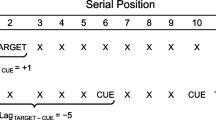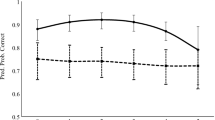Summary
Two experiments were designed to test a claim made by Gardiner (1988) that there are generation effects in implicit memory as measured by word-fragment completion. Subjects either read words at study or generated the words from fragments. As in previous research, fragments were completed to a greater extent if they were identical at study and test than if they differed. In Experiment 1 it was found that subjects could recognize explicitly the exact form of fragments that had been used for self-generation and distinguish these from other forms of fragments. An analysis of the contingency relations between recognition of fragments and fragment completion showed a high degree of dependence between the two tests. In Experiment 2 it was found that the match of surface features between study and test was a necessary, but not sufficient, condition to produce enhancement of priming. The results are interpreted as supporting the claim that generation does involve a data-driven component in addition to semantic elaboration.
Similar content being viewed by others
References
Gardiner, J. M. (1988). Generation and priming effects in word fragment completion.Journal of Experimental Psychology: Learning, Memory, and Cognition, 14, 459–501.
Gardiner, J. M. (1989). A generation effect in memory without awareness.British Journal of Psychology, 80, 163–168.
Gardiner, J. M., & Hampton, J. A. (1985). Semantic memory and the generation effect: Some tests of the lexical activation hypothesis.Journal of Experimental Psychology: Learning, Memory, and Cognition, 11, 732–741.
Gardiner, J. M., Dawson, A. J., & Sutton, E. A. (1989). Specificity and generality of enhanced priming effects for self-generated study items.American Journal of Psychology, 102, 295–305.
Glisky, E. L., & Rabinowitz, J. C. (1985). Enhancing the generation effect through repetition of operations.Journal of Experimental Psychology: Learning, Memory, and Cognition, 11, 193–205.
Graf, P. (1980). Two consequences of generating: Increased inter- and intraword organization of sentences.Journal of Verbal Learning and Verbal Behavior, 19, 316–327.
Graf, P., & Mandler, G. (1984). Activation makes words more accessible, but not necessarily more retrievable.Journal of Verbal Learning and Verbal Behavior, 23, 553–568.
Graf, P., & Schacter, D. L. (1985). Implicit and explicit memory for new associations in normal and amnesic subjects.Journal of Experimental Psychology: Learning, Memory, and Cognition, 11, 501–518.
Hayman, C. A. G., & Tulving, E. (1989). Contingent dissociation between recognition and fragment completion: The method of triangulation.Journal of Experimental Psychology: Learning, Memory, and Cognition, 15, 228–240.
Jacoby, L. L. (1983). Remembering the data: Analyzing interactive processes in reading.Journal of Verbal Learning and Verbal Behavior, 22, 485–508.
Jacoby, L. L., & Dallas, M. (1981). On the relationship between autobiographical memory and perceptual priming.Journal of Experimental Psychology: General, 110, 306–340.
Kolers, P. A., & Roediger, H. L., III (1984). Procedures of mind.Journal of Verbal Learning and Verbal Behavior, 23, 425–449.
Mandler, G. (1980). Recognizing: The judgement of previous occurrence.Psychological Review, 87, 252–271.
McElroy, L. A., & Slamecka, N. J. (1982). Memorial consequences of generating nonwords: Implications of semantic-memory interpretations of the generation effect.Journal of Verbal Learning and Verbal Behavior, 21, 249–259.
Rabinowitz, J. C., & Craik, F. I. M. (1986). Specific enhancement effects associated with word generation.Journal of Memory and Language, 25, 226–237.
Roediger, H. L., III, & Blaxton, T. A. (1987 a). Retrieval modes produce dissociations in memory for surface information. In D. S. Gorfein & R. R. Hoffman (Eds.),Memory and cognitive processes: The Ebbinghaus centennial conference (pp 349–379). Hillsdale, NJ: Erlbaum.
Roediger, H. L., III, & Blaxton, T. A. (1987 b). Effects of varying modality, surface features, and retention interval on priming in wordfragment completion.Memory & Cognition, 15, 379–388.
Roediger, H. L., III, & Weldon, M. S. (1987). Reversing the picture superiority effect. In M. A. McDaniel & M. Pressley (Eds.),Imagery and related processes; theories, individual differences, and applications (pp 151–174). New York: Springer-Verlag.
Slamecka, N. J., & Graf, P. (1978). The generation effect: Delineation of a phenomenon.Journal ofExperimental Psychology: Human Learning and Memory, 4, 592–604.
Squire, L. R., Shimamura, A. P., & Graf, P. (1985). Independence of recognition memory and priming effects. A neuropsychological analysis.Journal of Experimental Psychology: Learning, Memory, and Cognition, 11, 37–44.
Tulving, E. (1985). How many memory systems are there?American Psychologist, 40, 385–398.
Tulving, E., & Schacter, D. L. (1990). Priming and human memory systems.Science, 247, 301–306.
Tulving, E., Schacter, D. L., & Stark, H. A. (1982). Priming effects in word-fragment completion are independent of recognition memory.Journal of Experimental Psychology: Learning, Memory, and Cognition, 8, 336–342.
Warrington, E. K., & Weiskrantz, L. (1970). Amnesic syndrome: Consolidation or retrieval?Nature, 228, 628–630.
Author information
Authors and Affiliations
Additional information
This research was supported by a grant from the Swedish Council for Research in the Humanities and Social Sciences to Lars-Göran Nilsson.
Rights and permissions
About this article
Cite this article
Olofsson, U., Nilsson, LG. The generation effect in primed word-fragment completion reexamined. Psychol. Res 54, 103–109 (1992). https://doi.org/10.1007/BF00937138
Received:
Accepted:
Issue Date:
DOI: https://doi.org/10.1007/BF00937138




